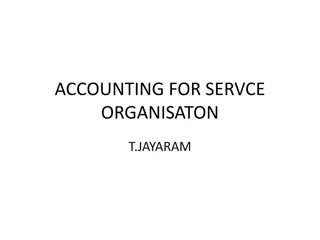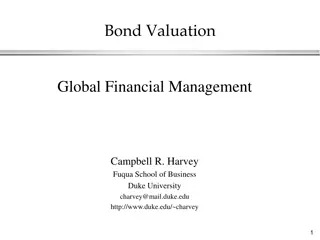Corporate Bonds: Issuance, Trading, and Security Features
Corporate bonds are long-term debt instruments issued by listed companies to fund expansion and investment. They are traded primarily in the over-the-counter market, offering security to investors through various asset types. Different types include fixed rate bonds with fixed maturity dates.
Download Presentation

Please find below an Image/Link to download the presentation.
The content on the website is provided AS IS for your information and personal use only. It may not be sold, licensed, or shared on other websites without obtaining consent from the author.If you encounter any issues during the download, it is possible that the publisher has removed the file from their server.
You are allowed to download the files provided on this website for personal or commercial use, subject to the condition that they are used lawfully. All files are the property of their respective owners.
The content on the website is provided AS IS for your information and personal use only. It may not be sold, licensed, or shared on other websites without obtaining consent from the author.
E N D
Presentation Transcript
CISI Financial Products, Markets & Services Topic Bonds (5.3) Corporate bonds cisi.org
What are corporate bonds? As we saw before, corporate bonds are issued by listed corporate entities to fund expansion and finance investment. A corporate bond is usually restricted to longer-term debt instruments, with a redemption date that is more than one year away at the point of issue. A commercial paper refers to instruments with a shorter maturity. It only tends to be well established and relatively stable companies that can issue bonds with a maturity greater than ten years at an acceptable cost cisi.org
How are they traded? Most corporate bonds are listed on stock Exchanges. However ,the majority of trading does not take place on the stock exchange systems. Instead, most bonds dealing is done in the over-the- counter (OTC) market, between professionals that is, directly between market counterparties. cisi.org
Features of corporate bonds - Security What happens when an individual doesn t pay their mortgage? The lender makes sure that it has the ability to repossess the property if the scheduled mortgage payments are not made! The same principle applies with corporate bonds. This is known as security. Bond Security Security refers to the guarantee provided to the investor that the bond will be repaid. Security usually means a legal charge over some or all of the bond issuer s assets e.g. Properties (offices and factories), unsold goods or uncollected debts If the issuer fails to pay the required coupons or the principal on the bonds, the bondholders can claim those assets in order to recoup the money that is owed to them. Bondholders regard their borrowings as safer than if there were no security. Logically, the greater the value of the security offered relative to the amount borrowed, the lower the cost of borrowing should be. cisi.org
Features of corporate bonds - Security Different types of security may be offered: A specific asset, such as the head office of the company, or a particular factory, provides the security for the loan. General assets of the company are offered as security for the loan, which might include the company s cash at the bank, trade debtors and unsold stock. A guarantee from another organisation or individual that if the issuer defaults, they will repay the bondholders e.g. A bank cisi.org
Types of corporate bonds Fixed Rate Bonds Fixed Rate Bonds The date of maturity and repayment of the nominal value will remain fixed throughout the life of the bond Paid yearly or half-yearly cisi.org
Types of corporate bonds Floating Rate Notes (FRNs) Floating Rate Notes (FRNs) Coupon rate will be linked to a published rate of interest London InterBank Offered Rates (LIBOR) are published daily by a trade body called the British Bankers Association. FRNs usually pay interest at LIBOR plus a quoted margin or spread. cisi.org
Categorising bonds Bonds can also be categorised geographically: Category Domestic Bond Issuer Domestic Company e.g. UK company Market Domestic Market e.g. UK investors Currency Domestic currency e.g. In sterling Foreign Bond Domestic Market e.g. UK investors Domestic currency e.g. In sterling Overseas Company e.g. US company cisi.org
Categorising bonds - Eurobonds Eurobonds are basically large international bond issues that are often made by governments and multinational companies. Most eurobonds are issued as conventional bonds (or straights ), with a fixed nominal value, fixed coupon and known redemption date. Most Eurobond activity takes place out of London Characteristics Key Features: Category Eurobond Issued out of London Currency $US Denominated in a currency different from that of the financial centre or centres in which they are issued. Eurobond Hong Kong Eurobond issues are often issued in a number of financial centres simultaneously. Security Do not provide any underlying fixed or floating security to the bondholders Instead they are assessed by one of the credit ratings agencies Issuing company typically includes a negative pledge clause in the bond o Prevents the company from subsequently making any secured bond issues oStops any seniority over a company s assets in the event of liquidation cisi.org
Categorising bonds Advantages of Eurobonds Eurobonds offer advantages over using domestic bonds: Choice of innovative products to more precisely meet issuers needs Ability to reach potential lenders internationally rather than just domestically Lower funding costs due to the competitive nature and greater liquidity of the market Ability to make bond issues at short notice Advantages of issuing Eurobonds Less regulation and disclosure Gross interest payments made to investors Anonymity to investors as issues are made in bearer form (there is no register of bondholders maintained by the issuer) cisi.org























